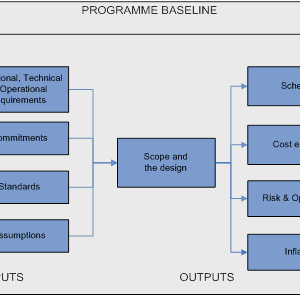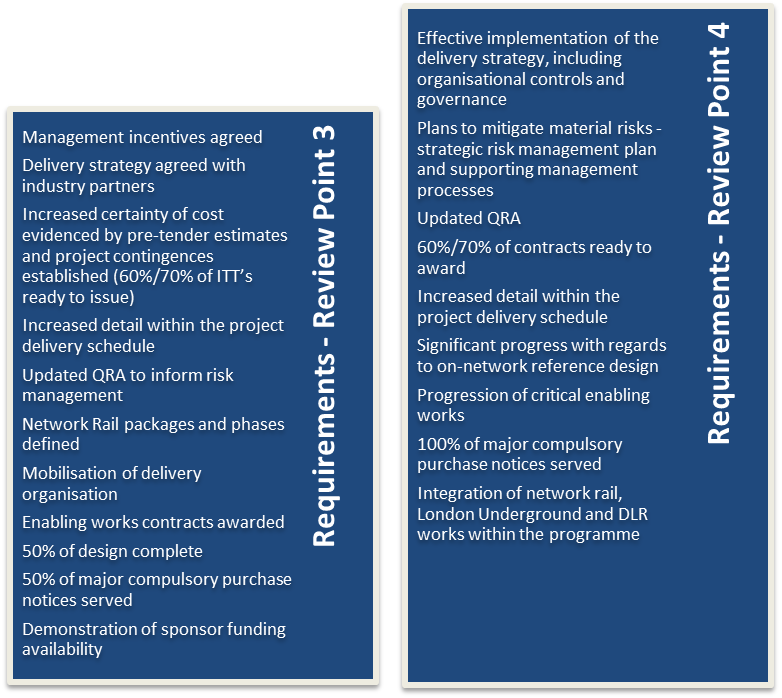
Initial Control Baseline and Review Points
Document
type: Micro-report
Author:
Julian Bartlett
Publication
Date: 09/07/2018
-
Abstract
This paper explains Crossrail’s response to the Government’s 2010 Comprehensive Spending Review, which instigated a comprehensive value management exercise to optimise the programme. This lead to increased sponsor confidence in Crossrail’s affordability, leading to the issue of a Positive Project Review Notice (PPRN) for Review Point 4 (RP4). This paper explains the importance of Programme Controls in this process, which ultimately lead to full delegated authority being given to the Crossrail Board to deliver the programme in accordance with the Delivery Strategy, as well as full funding.
This paper is applicable to any major project or programme in the pre-construction phase, aiming to successful establish programme controls to navigate government review points.
-
Read the full document
Introduction
Baseline development is a critical activity in any programme. The production of the Initial Control Baseline (ICB) was a major step in improving the certainty of the plan for the delivery of Crossrail. It allowed CRL and its partners to exercise significantly improved control of programme delivery. It also provided a major input to increase Sponsor confidence in the programme.
Crossrail has had baselines at several stages in its evolution, the first was the baseline established to support the signing of the Agreements in December 2008. The ICB built on this and provided the basis of decisions to support progress through the Review Points defined within the Project Development Agreement:Figure 1 – Review points 3 and 4 defined in the Project Development Agreement
The degree of change in requirements and design development since that time, together with the mobilisation of delivery partners, made it imperative that a new baseline was established for programme control purposes. It was also necessary to obtain buy-in from the new management team and delivery partners and to form a reliable and comprehensive understanding of future changes.
The Baseline Update Report provided at Review Point 3a in October 2009 highlighted a number of weaknesses within the baseline documentation then in existence, which gave rise to significant uncertainty within the programme scope, schedule and cost forecast. There was generally loose alignment between requirements, scope, and schedule and cost forecasts. Commitments and standards had been identified, but these were not reflected in the detailed plans. Although the design was fairly mature for the Central Section Works (CSW) tunnels and stations, it was rather less so for Crossrail Surface, Systems, Rolling Stock and Depot. The schedule focused on the design and construction of these more mature elements and was not representative of the entire programme and all stages. The focus of the ICB was to address these issues, whilst refreshing cost and schedule forecasts, and ultimately to establish the reference point for programme management and change control.Benefits
The ICB represents the output from a comprehensive programme-wide re-assessment of requirements, design, scope, schedule, estimate, risks and inflation. This is illustrated below.
Figure 2 – Development of the Programme Baseline
The key development steps which were undertaken are as follows:
• Crossrail’s Project Functional Requirements aligned with the Sponsors’ Requirements;
• Crossrail Surface requirements defined in the On-Network Functional Requirements, instructed to Network Rail, and reflected in the baseline;
• Technical and operational requirements defined and apportioned to Crossrail Central and Industry Partners;
• Modelling of the service operational performance gave rise to an amended reliability and availability specification, giving a high degree of confidence that the target for performance would be achieved;
• All programme commitments recorded in a database and allocated to parties responsible for their discharge;
• The Standards Baseline was largely defined and agreed with the Infrastructure Managers, forming the basis of the Central Section Works design;
• The Assumptions Register was updated, based upon a review of detailed statements of assumptions and exclusions from Crossrail Central and Industry Partners;
• A comprehensive Work Breakdown Structure (WBS) supported by an explanatory Scope Book was established and agreed, and applied in structuring the baseline data;
• Network Rail’s Preliminary Programme Baseline (PPB), for what is now termed the “Crossrail Surface” project, was intensely scrutinised, with Crossrail and Network Rail working together to identify opportunities to deliver the surface works within the available £2.3bn funding;
• A comprehensive update of the programme estimate was undertaken, drawing in particular upon the Network Rail estimate from the PPB and Crossrail Central’s estimate update;
• Schedule inputs from the various delivery parties were developed and integrated into a Master Control Schedule (MCS) which was used to establish the programme critical path, and as a strategic planning tool;
• The programme risk model was fully updated to reflect a bottom-up view of risks from Crossrail Central and to align with the current estimate and schedule, resulting in a new Quantified Risk Analysis (QRA); and
• Expenditure was phased in accordance with the Master Control Schedule to generate an overall programme cost forecast, taking account of the latest inflation forecast.
The Initial Control Baseline therefore represented a significant improvement of the basis for controlling the scope, costs and schedule for delivery of Crossrail. It provided a suite of control information which was synchronised to a much higher degree than previously. It reflected the input plans of the various project delivery partners, and had the ownership in particular of Crossrail Central and Network Rail. It provided a robust short term schedule and budget for immediate control activity.
It must, however, be recognised that this exercise was done at an early stage in Crossrail’s delivery. There were a number of limitations with respect to design maturity, schedule robustness and estimate market testing, and as a result, this baseline required review with any changes made through compliance with a rigid change control procedure. As Crossrail developed in the early stages following establishment of the ICB, it became apparent that the schedule was a pressure point, and the costs were challenged as part of the Governments Comprehensive Spending Review (CSR). As a result, following thorough review and de-risking of the end of the programme, a staged opening schedule was adopted, as well as a plan to drive the tunnels before the station boxes. These changes had the effect of increasing the length of the overall schedule, but reducing the costs due to the reduced risks. This strategy was agreed through the change control process and provided the basis for the passing of DFT’s review point. The revised programme was known as RP4.2, and is the baseline against which cost and schedule progress was monitored against for the duration of delivery.Recommendations for Future Projects
Depending on the size and complexity of the programme, do not underestimate the time taken to produce a robust programme baseline. Crossrail is a complex programme and the initial baseline took circa 7 months. The time invested however, has paid dividends as it provided a firm basis from which to control change.
-
Authors
Julian Bartlett - Crossrail Ltd, Turner & Townsend
Director – Turner & Townsend
Crossrail Head of Cost
Julian Bartlett is a Director at Turner and Townsend and has 18 years’ experience in commercial management on a wide range of major projects. Julian has been at Crossrail since September 2009 as Head of Estimating, and latterly Head of Cost within the Programme Controls function, including acting as the Cost lead for all Crossrail station projects. His role has primarily entailed management of estimate production and the commercial review and challenge of estimates produced by all the industry partners including Network Rail and LUL, as well as leading the management of cost post-contract to ensure value.


